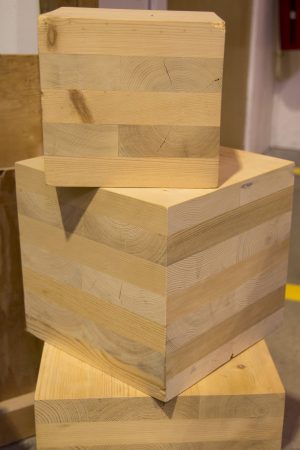 Picture a hospital and you might imagine concrete, stainless steel or plastic. But University of Oregon researchers hope to make wood—often overlooked in health care facilities—more commonplace in those settings. Exposed wood, they’ve found, can resist microbial growth after it briefly gets wet. During their study, wood samples tested lower for levels of bacterial abundance than an empty plastic enclosure used as a control. “People generally think of wood as unhygienic in a medical setting,” said assistant professor Mark Fretz, co-director of the UO’s Institute for Health in the Built Environment and principal investigator for the study. “But wood actually transfers microbes at a lower rate than other less porous materials such as stainless steel.” In a recent study published in Frontiers in Microbiomes, they shared their discoveries about the effects of moisture on surface microbes and volatile organic compound emissions from mass timber.
Picture a hospital and you might imagine concrete, stainless steel or plastic. But University of Oregon researchers hope to make wood—often overlooked in health care facilities—more commonplace in those settings. Exposed wood, they’ve found, can resist microbial growth after it briefly gets wet. During their study, wood samples tested lower for levels of bacterial abundance than an empty plastic enclosure used as a control. “People generally think of wood as unhygienic in a medical setting,” said assistant professor Mark Fretz, co-director of the UO’s Institute for Health in the Built Environment and principal investigator for the study. “But wood actually transfers microbes at a lower rate than other less porous materials such as stainless steel.” In a recent study published in Frontiers in Microbiomes, they shared their discoveries about the effects of moisture on surface microbes and volatile organic compound emissions from mass timber.